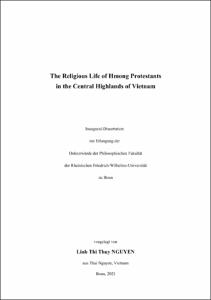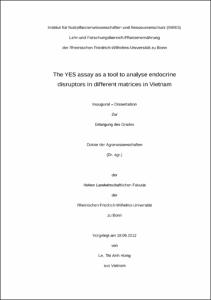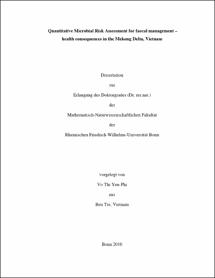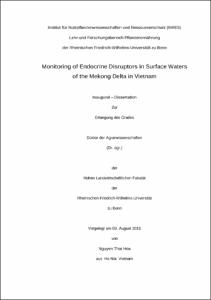Nguyen, Linh Thi Thuy: The Religious Life of Hmong Protestants in the Central Highlands of Vietnam. - Bonn, 2021. - Dissertation, Rheinische Friedrich-Wilhelms-Universität Bonn.
Online-Ausgabe in bonndoc: https://nbn-resolving.org/urn:nbn:de:hbz:5-64438
Online-Ausgabe in bonndoc: https://nbn-resolving.org/urn:nbn:de:hbz:5-64438
@phdthesis{handle:20.500.11811/9394,
urn: https://nbn-resolving.org/urn:nbn:de:hbz:5-64438,
author = {{Linh Thi Thuy Nguyen}},
title = {The Religious Life of Hmong Protestants in the Central Highlands of Vietnam},
school = {Rheinische Friedrich-Wilhelms-Universität Bonn},
year = 2021,
month = nov,
note = {Since taking over the country, the Vietnamese government has been heavily criticized for their policies and actions on addressing religion and ethnic minorities-related matters. ‘Religious freedom’ is believed to be significantly restricted and ‘the life and voices of marginalized minorities’ are said to be largely taken for granted. By exploring a specific case that covers both given concerns, the thesis provides insights into how an ethnic minority group – the Hmong – has been actively living out their religious faith in a communist country since the very first mass conversion to a western religion even though the hardships on multiple life aspects that they have to confront are countless, unseen, and untold.
The dissertation is built on intensive ethnographic fieldwork that was mainly done at a focal village called Yagad in the Central Highlands. Also, several field trips were conducted in some other Hmong villages of Vietnam to gather comparative data. Along with detailed participant observation notes and a variety of field notes, the research appreciates more than 100 participants’ thoughts and voices. In terms of the data analysis, interpretation, and writing-up processes, they have been done mainly in the field of Science of Religion (Religionswissenschaft). Structurally, Part I explains how the research is defined and designed and how the whole research is processed methodologically. Part II is on the Hmong and their Encounters with Christianity on regional and global scales. A more significant portion of their current conversion to Protestantism in Vietnam is reconsidered and illuminated by numerous narratives collected in the field. Part III, titled ‘the Hmong Protestants of Vietnam: An Ethnographic Study,’ intensively explores the religious life of Hmong converts in a focal village of the Central Highlands. Firstly, this part re-examines existing conclusions on mass Hmong migrations southwards in the early 1990s empirically proved to be driven by religion-related causes. It also provides a detailed investigation of their religious practices and beliefs after their conversion in the late 1980s. As a matter of fact, the Hmong converts have been establishing a well-organized church in their own ways, creating a viral religious environment that enables every adherent to intensify their faith in preferable manners. Regarding religious belief, Hmong converts’ significant changes and their concrete expressions are displayed, confirming their unique way of believing in and communicating with God compared with their Christian counterparts worldwide. Furthermore, by examining the inter-group relations between the defined Hmong group with other groups of different ethnic and political backgrounds, this Part III shows the Hmong’s process of defining ‘Peb Hmoob’, building up and strengthening their community in the alien society. Such a successful process allows them to follow their religious group in a respected co-existence of varied Protestant denominations without any problems due to denominational differences, cohabit with other ethnic groups in harmony, and freely practice their freedom of religion in boundaries. Finally, by discovering Hmong Protestants’ religious ethic, their identity markers in the Protestant context, and considering the remaining changes and concerns present in their community, the impact of ‘being a Protestant’ on these ethnic minority people’s lives is revealed, highlighting how their ethnic and religious identities have been negotiated, which eventually results in a reconstructed identity as ‘Hmong Protestants.’},
url = {https://hdl.handle.net/20.500.11811/9394}
}
urn: https://nbn-resolving.org/urn:nbn:de:hbz:5-64438,
author = {{Linh Thi Thuy Nguyen}},
title = {The Religious Life of Hmong Protestants in the Central Highlands of Vietnam},
school = {Rheinische Friedrich-Wilhelms-Universität Bonn},
year = 2021,
month = nov,
note = {Since taking over the country, the Vietnamese government has been heavily criticized for their policies and actions on addressing religion and ethnic minorities-related matters. ‘Religious freedom’ is believed to be significantly restricted and ‘the life and voices of marginalized minorities’ are said to be largely taken for granted. By exploring a specific case that covers both given concerns, the thesis provides insights into how an ethnic minority group – the Hmong – has been actively living out their religious faith in a communist country since the very first mass conversion to a western religion even though the hardships on multiple life aspects that they have to confront are countless, unseen, and untold.
The dissertation is built on intensive ethnographic fieldwork that was mainly done at a focal village called Yagad in the Central Highlands. Also, several field trips were conducted in some other Hmong villages of Vietnam to gather comparative data. Along with detailed participant observation notes and a variety of field notes, the research appreciates more than 100 participants’ thoughts and voices. In terms of the data analysis, interpretation, and writing-up processes, they have been done mainly in the field of Science of Religion (Religionswissenschaft). Structurally, Part I explains how the research is defined and designed and how the whole research is processed methodologically. Part II is on the Hmong and their Encounters with Christianity on regional and global scales. A more significant portion of their current conversion to Protestantism in Vietnam is reconsidered and illuminated by numerous narratives collected in the field. Part III, titled ‘the Hmong Protestants of Vietnam: An Ethnographic Study,’ intensively explores the religious life of Hmong converts in a focal village of the Central Highlands. Firstly, this part re-examines existing conclusions on mass Hmong migrations southwards in the early 1990s empirically proved to be driven by religion-related causes. It also provides a detailed investigation of their religious practices and beliefs after their conversion in the late 1980s. As a matter of fact, the Hmong converts have been establishing a well-organized church in their own ways, creating a viral religious environment that enables every adherent to intensify their faith in preferable manners. Regarding religious belief, Hmong converts’ significant changes and their concrete expressions are displayed, confirming their unique way of believing in and communicating with God compared with their Christian counterparts worldwide. Furthermore, by examining the inter-group relations between the defined Hmong group with other groups of different ethnic and political backgrounds, this Part III shows the Hmong’s process of defining ‘Peb Hmoob’, building up and strengthening their community in the alien society. Such a successful process allows them to follow their religious group in a respected co-existence of varied Protestant denominations without any problems due to denominational differences, cohabit with other ethnic groups in harmony, and freely practice their freedom of religion in boundaries. Finally, by discovering Hmong Protestants’ religious ethic, their identity markers in the Protestant context, and considering the remaining changes and concerns present in their community, the impact of ‘being a Protestant’ on these ethnic minority people’s lives is revealed, highlighting how their ethnic and religious identities have been negotiated, which eventually results in a reconstructed identity as ‘Hmong Protestants.’},
url = {https://hdl.handle.net/20.500.11811/9394}
}









